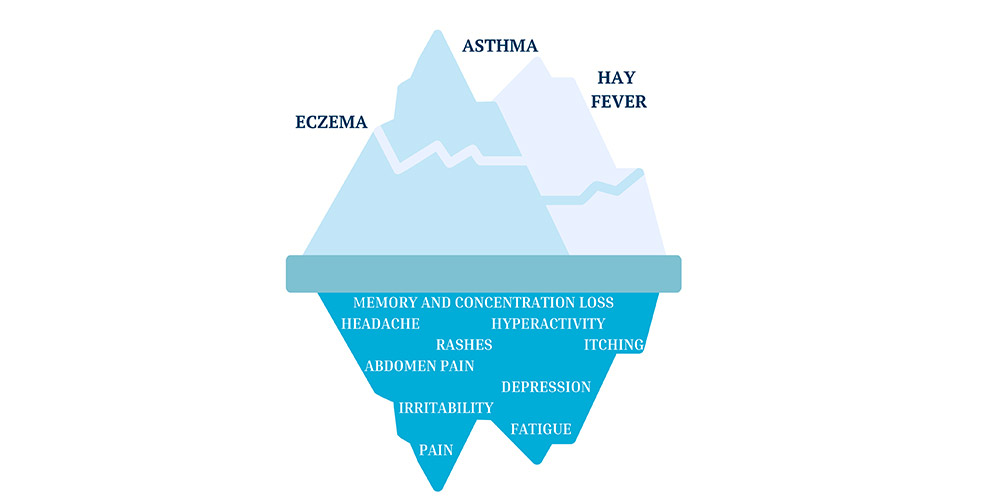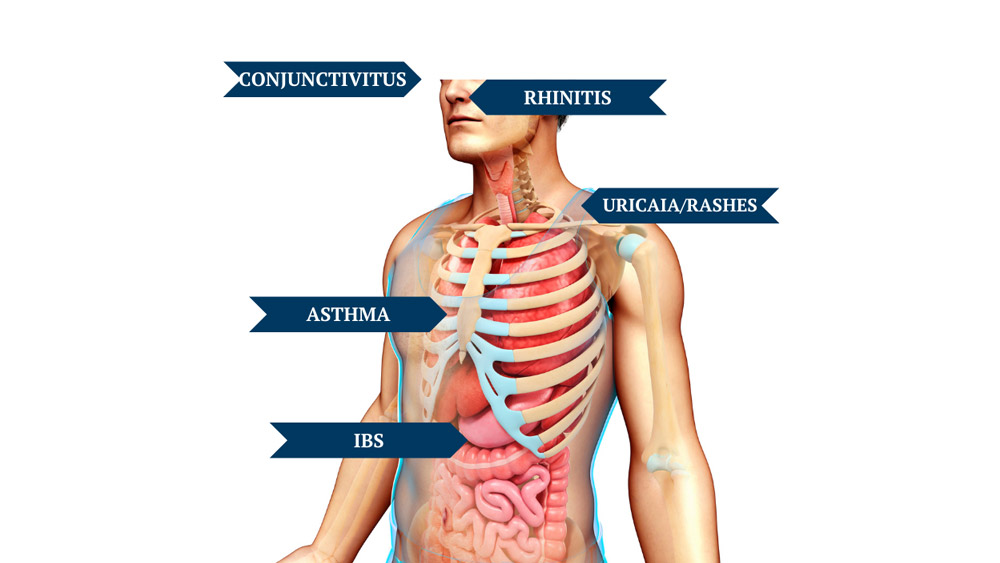This is where the cause is known and you can avoid it and be free from allergic symptoms.
Is the type of allergy that, even after years of suffering from allergy one cannot know the cause of allergy. We diagnose both apparent and hidden allergies.

Allergy affects each organ of the body differently, but the symptoms are like the iceberg above. As person may be suffering from either Allergic Rhinitis (hay fever) or Asthma, Urticaria or IBS (one of these) which is the tip of the iceberg, but he/she will be suffering from less severe symptoms like headache, rashes, itching, abdomen pain, depression, irritability, fatigue tiredness, memory and concentration problems, pains and aches. American Wellness Center based in Dubai Healthcare City specializes in Allergy Care and Immunotherapy services.

HEAD: Headache, dizziness, decrease in memory and concentration, irritability, and aggressiveness may cause schizophrenia. Losing interest in daily activities.
NOSE: Itching nose, sneezing, watering nose, nasal blockage.
THROAT: Sore throat, pharyngitis, swelling of voice box causing immediate suffocation and even death due to allergic reaction or anaphylaxis, back dripping.
EARS: Impaired hearing, ringing in the ears.
LUNGS: Asthma
SKIN: Itching, hives, rashes and eczema.
URINARY TRACT: Frequent desire to pass urine
GASTROINTESTINAL TRACT: IBS, reflux, heartburn due to acidity in the stomach, pain in the stomach due to ulcer which worsens in the pollen season. Or other allergies. Food allergies can be the cause of hyperacidity, reflux, or even ulcer. People develop frequent loose stools, gas, distention, and pain in the abdomen during the pollen season or due to other allergies
BODY: Feverish feeling but doesn’t have a fever, pains, and aches in the body. Low energy level and patients feel drained off, fatigued, and tired.
If two parents have allergic genes, then 3 out of 4 children will develop allergic diseases at any time in life from infancy to old age. Allergy progresses both in severity and in frequency with time despite the medicines like antiallergics and steroids.
Did you know it is a misconception that allergies cannot be treated? I believe in finding the cause of allergy and treating it. I strongly affirm the international consensus that allergy is a genetically transmitted immune disease and cannot be treated with symptomatic treatments and it has to be treated immunologically and with Immunotherapy (SLIT drops/tablets, SCIT, or allergy shots).
Allergy is often like the iceberg illustrated above where a person is already aware of the symptoms but does not know what is causing the problems. You can either choose to treat the symptoms with drugs or look for the cause and treat it.
If you choose to treat the symptoms your condition is likely to reduce your discomfort for a short time but ultimately you see the symptoms worsen and you will feel more sick. Around 80% of nasal allergy treatments develop allergic asthma. Your immune system is affected and one can easily develop more frequent infections. In the long run only treating symptoms becomes less effective and is costly spending on inhalers, antiallergics in most severe cases steroids where there are even more side effects.
When you treat the cause your condition you are more likely to improve and you will feel better, with less need for medicines.
ALLERGY is not a disease which one can diagnose in 5 minutes. One has to find the cause of the allergy through thorough testing and treat the cause. It takes on average 3 to 4 hours to find the cause of allergy.
After an initial consultation, I conduct extensive testing relating to our patient's complaints. The established treatment of allergy is immunotherapy which should be given for a minimum of 3 years. To find the cause we do the world's latest Painless Allergy Tests with the special disposable sterilized device and do 8 tests at a time and these are painless. For foods we do skin prick tests and also confirmed with painless intradermal tests causing minimal pain. Since effective treatment will depend on the results of the allergy tests so we do comprehensive tests and it takes around 3-4 hours to complete the procedure. We do this with utmost safety and precaution. Patients are never left alone and always have a nurse of the Dr with them to monitor them as well as having an anaphylaxis kit and anaphylaxis cart for management of emergency allergic reactions.
There are two type of treatments available. Once allergy tests are complete the results of these tests are tabulated and given to the patient. The patient is advised to get the immunotherapy from different vendors of their choice. They must send the prescription and the registered pharmacy or facility prepares it according to the formulation provided (as per the allergy tests).
Most of our patients have remarkable improvement in 2-3 months. If some patients are not improving, we do a free reassessment. If a patient is not improving after 6 months even after reassessment then immunotherapy is discontinued, sadly 10% of patients are non responders.
All my patients are on my WhatsApp and they are advised to keep me updated with their progress and ask me any questions they have in mind to ensure high quality care.
YES … After 30 years of experience in allergy and immunology seeing thousands of international patients suffering from different allergies and skin allergies, most of my patients have been cured with immunotherapy and they now lead an allergy-free life. I always say to my patients: With our novel allergy and immunology treatment you will not only feel better but you will look better too.
I always had concerns about allergic reactions to cosmetics and hair dyes. To help the patients and understand the mechanisms of cosmetic science, I completed a one-year Diploma in Cosmetic Science Formulations from Australia. After realizing there are allergens in these products I developed novel cosmetic, dermatological products and anti-hair fall products that are hypoallergenic and have a strong scientific basis. It is important to read the ingredients in all your cosmetics carefully to avoid suffering in the future. As per the FDA allergens to avoid in cosmetics are grouped into 5 categories: natural rubber, fragrances, preservatives, dyes, and metals.
Give us a call or Visit us in Dubai Healthcare City today.